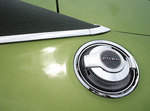Going green: is algae the answer to our fuel needs?
Work to develop a clean, "green" fuel that could help solve the global energy crisis has taken on a new meaning at the University of Adelaide. Researchers from the School of Chemical Engineering are focusing their attention on using green algae as a potential source of biofuel. The Adelaide research - led by Dr David Lewis and Dr Peter Ashman - is part of an innovative $1.89 million project funded by the Federal Government. Headed by Murdoch University in Western Australia, the project involves research partners in India and China. The project hopes to identify a clean, affordable method of producing biodiesel from algae on an industrial scale, which is currently cost prohibitive. In Adelaide, researchers have begun cultivating algae on a small scale in two-metre square tanks specially built by Chemical Engineering technical staff. Based on the roof of one of the University's many North Terrace Campus buildings, the tanks are exposed to the sun and the elements, simulating the real conditions of a much larger scale operation. "Our team's main role is to determine the best methods possible for harvesting the algae and extracting the oil from it," Dr Ashman said. "In order to produce biofuel on an industrial scale, millions of cubic metres of algae would need to be cultivated in marine ponds covering about 50-100 square kilometres. That might sound incredibly big, but it's actually small compared to the amount of canola you would need to produce the same amount of biodiesel - it would be about 5000 square kilometres of canola. "These small-scale tanks in Adelaide are just the very beginning. We started with only 5ml of algae, and now each pond contains about 400 litres of algae. We're extracting between 50-100 litres of microalgae culture per day for our experiments. "The next step up from this will be to apply what we've learned from these small-scale ponds to a larger, pilot-scale saline pond, which will be about 250 square metres," he said. "Another key aspect of this project is that it looks at so-called 'second generation' biofuels, which do not compete for resources with food crops. Our algae will grow on non-arable - even arid - land without any need for fresh water in cultivation. Canola needs lots of fresh water and good-quality farming land." The algae cultivated and harvested in Adelaide enables the researchers to test various methods of extracting oil. This involves breaking the algae cells open to release the natural oil they contain. The algal oil can then be converted into biodiesel. "We can break the cells in the lab using a centrifuge, but a centrifuge is not going to work at a large, industrial level. We need a method that will be low on energy and low on cost," Dr Lewis said. "We're looking to use organic solvents and other means to extract the oil - methods that could potentially be applied to an industrial setting. "In addition to that work, our team is also conducting an economic and lifecycle assessment, because an important question that needs to be solved by this research is: what can we do with all the biomass?" The Adelaide team, which includes three PhD students and one postdoctoral researcher, is excited by the challenge such a project offers. "If we're able to apply what we learn to a much bigger algae crop, it could potentially have great benefits for Australia and for the world over," Dr Lewis said. Story by David Ellis
|





